Dynamite comes in small packages, which couldn’t be more true for the fun-loving and feisty Yorkiepoo. This designer dog is a mix between a Toy or Miniature Poodle and the Yorkshire Terrier. In this article, we’re exploring the Yorkiepoo temperament so you can decide if this breed is right for you.
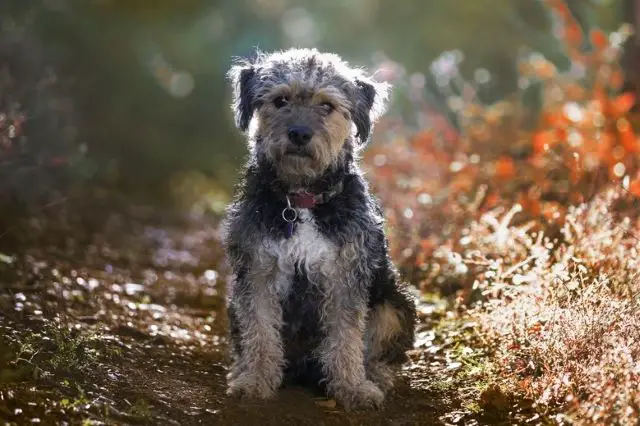
Training, socialization, and hereditary traits influence a Yorkiepoo’s temperament. Nevertheless, the Yorkiepoo has an intelligent, affectionate, feisty, and courageous temperament. Yorkiepoos make delightful little companions who fit well into most homes and are well-suited to apartment life.
If you’ve seen the adorable little Yorkiepoo (or Yorkipoo), and you’re pretty much sold on getting one, it’s good to understand their temperament before bringing one home. So read on for a comprehensive guide to the adorable Yorkiepoo temperament.
The Yorkiepoo Temperament
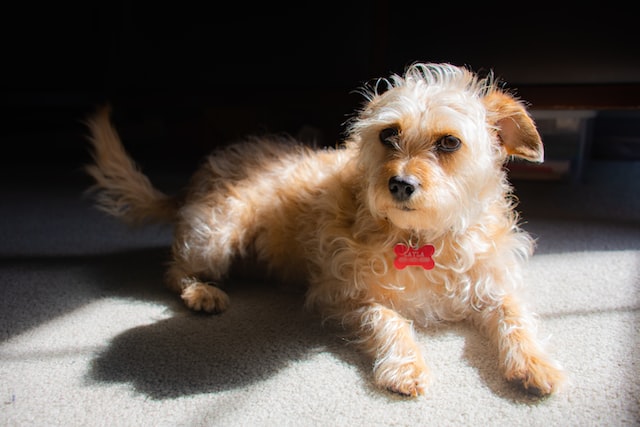
The temperament of a mixed-breed dog can be unpredictable. So when considering a Yorkiepoo, it’s advisable, to meet at least one of the parents. This will help you get an idea of what the puppy’s temperament could be like when they grow up.
There are, however, common traits you may find in Yorkiepoos.
The Yorkiepoo is Intelligent
They may be small but you shouldn’t undermine the Yorkiepoo’s intelligence. With both the Poodle and the Yorkshire Terrier being incredibly bright breeds, the Yorkiepoo gets the best of both worlds regarding its intelligence.
These dogs excel in training, although their intelligence means they might have some stubbornness to work through. Try your best to make the sessions fun and interactive when training them. If you give your Yorkipoo a lot of praise and treats, they tend to respond well to training.
The Yorkiepoo is Affectionate
These little fluffy friends love to be loved, and they return it to their owners a hundred-fold. If there’s one thing Yorkiepoos adore, it’s spending as much time in the company of people as possible.
This affectionate trait also makes Yorkipoos incredibly loyal and great companions for anyone. They are naturally curious and love to meet new people, and they’re open to being held and snuggled as long as they have been well-socialized.
You should ensure your Yorkiepoo is well-socialized or taken for socialization classes at a young age. Or else its feisty nature can outweigh its affectionate side.
The Yorkiepoo is Feisty
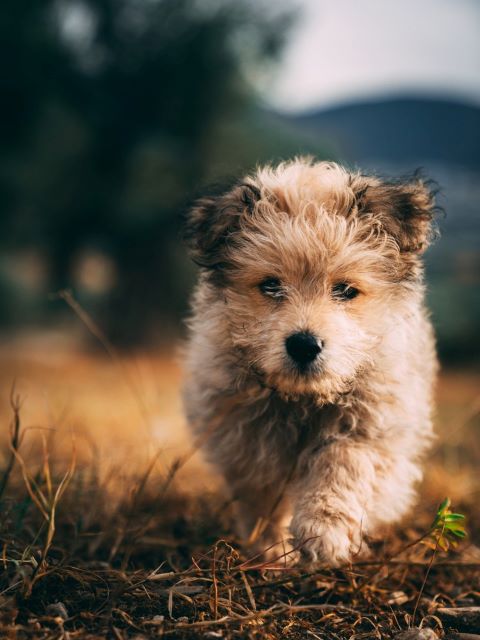
It might be necessary to socialize your Yorkiepoo at a young age due to its feisty streak. These adorable little balls of fluff can have quite the attitude, thanks to the confident nature inherited from the Yorkshire Terrier genes.
Enrolling your Yorkiepoo puppy in puppy kindergarten classes is a great way to ensure your dog gets adequate socialization. If puppy kindergarten isn’t something you’d want to do, then invite visitors to your home or take your Yorkiepoo for regular walks in busy parks. Places with lots of people and other dogs are a natural way to socialize your Yorkiepoo.
A Yorkiepoo who has not been well-socialized will bark at everyone and everything and naturally be more suspicious around new people.
The Yorkiepoo is Courageous
These little dogs are incredibly courageous as a result of their inheriting curiosity and confidence from the Yorkshire Terrier parent. These dogs are not afraid to bark down some massive dogs and look danger right in the eye. It’s good that their bark is worse than their bite because if a giant breed of dog had a Yorkiepoo’s confidence, it would be very intimidating.
The Yorkiepoo is Active
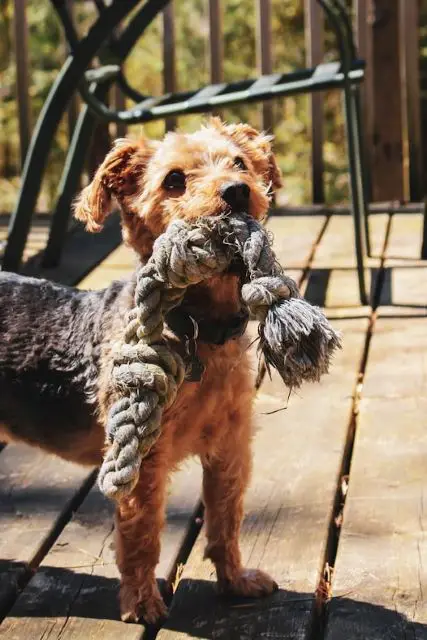
Tons of playful energy is what the Yorkiepoo runs on. This breed is typically very active. Even from puppyhood, they’ll happily chase after you, your children, other people, and other pets. Their activeness and playfulness are two of the most favorable inherited traits from the Poodle and the Yorkshire Terrier.
This does mean, like all dogs, that Yorkiepoos require a good amount of daily exercise. Neglecting the exercise needs of a Yorkiepoo results in barking and hyperactiveness. They love to go for walks or play in the yard or at the park.
Are Yorkiepoos Aggressive?
Yorkiepoos are not aggressive dogs at all. Their feistiness is something to note, but a Yorkiepoo is not known to growl or be over-protective. Like any other dogs, they might become irritated if they’re played with too roughly or if playtime with young kids lasts too long.
It is worth being aware that, due to the Yorkiepoo being such a small breed, they can easily be hurt when handled roughly. So be mindful of them when around small children to ensure they’re not mishandling them. Please encourage them to be as gentle as possible with these smaller dogs.
Do Yorkiepoos Get Along with Cats?
Usually, Yorkiepoos get along well with other pets, including cats. But, of course, the Yorkshire Terrier prey drive might cause your Yorkiepoo to chase cats occasionally. Though you can be assured it’s not out of aggression but purely for fun.
If you have cats, ensure your Yorkiepoo becomes well-acquainted with them from as young as possible to minimize the urge to chase cats.
Are Yorkiepoos Good with Other Dogs?
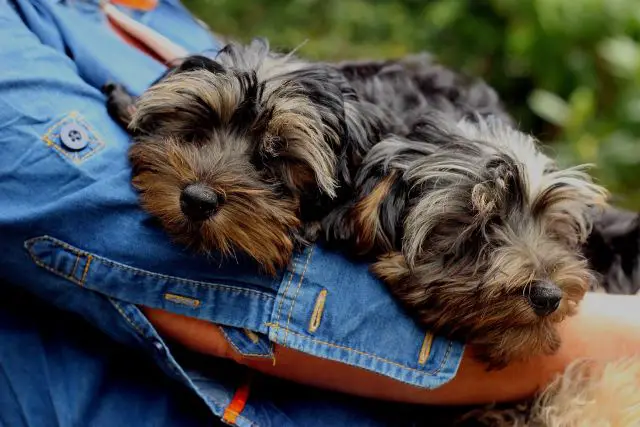
Yorkiepoos are generally quite good with other dogs. However, they don’t quite grasp how small they are compared to other breeds. As a result, you might find a few comical friendships between the Yorkiepoo and their bigger friends, where the Yorkiepoo is the one calling the shots in the relationship.
My little dog formed a good friendship with one of the Great Danes in our local park. For obvious reasons, being the drastic difference in their size, I made sure to keep a close eye on them as they played and ran around. It was always amusing to see the confidence in my little dog as she played with this colossal gentle teddy bear of a Great Dane.
Are Yorkiepoos Good with Strangers?
A true nature of a Terrier is to be curious and somewhat suspicious of strangers. With a Yorkiepoo, it could go either way. When strangers come to the house, your Yorkiepoo will quickly let you know.
Once they’ve seen you greet the visitor, some Yorkiepoos will drop their guard and be friendly, but others might stay alert. They won’t be over-protective or aggressive toward the visitor, but it might take some time for them to get used to the new person.
How your Yorkiepoo reacts around strangers really depends on how well they’ve been socialized as a puppy.
Do Yorkiepoos Make Good Family Pets?
The playful and affectionate nature of the Yorkiepoo makes it a great family pet. But they will adjust better to families with older, more conscientious kids that are less likely to hurt the little fur baby accidentally. Still, they adapt well to all home situations.
If you’re looking for a vocal, active, loveable little dog who would love to cuddle up with you at any given moment, the Yorkiepoo is the dog for you. A great aspect of the Yorkiepoo is that it’s so tiny it usually fits right into any household, whether it be an apartment or a grand house with a garden. They are phenomenal family pets as long as they get some love, exercise, and good socialization.
Are Yorkiepoos Good with Children?
While Yorkiepoos might be good with children, they are more suited to homes with older and more gentle children. Yorkiepoos might get irritated around younger children as they are usually rough when playing with dogs.
If you have younger children and the Yorkiepoo is the only dog for you, make sure never to leave your young ones unsupervised with a Yorkiepoo. It doesn’t matter if the Yorkiepoo is a puppy or an adult; children should always be taught to be gentle with dogs of all kinds. Especially around smaller breeds like the Yorkiepoo.
Small children might pull ears and tails, which can easily lead to injuries from either side. So continuously monitor playtime with children and Yorkiepoos, and teach the children never to go too close to a dog when sleeping or eating, even if they’re friendly.
Further reading:
- Yorkiepoo Coat Types And How To Care For Them
- Yorkiepoo Health Problems: What You Should Know Before Buying
- Male Vs Female Yorkiepoo: Which is Better?
- How Big Will A Yorkiepoo Get? Size and Weight Guide
- Yorkiepoo Generations Explained – F1, F1b, F2, F2b, F3 and More
- Yorkiepoos: Understand The Barking Habits Of Yorkiepoo Dogs
- Yorkiepoo Exercise Requirements for Health and Happiness
- The Average Life Expectancy Of A Yorkiepoo
- Are Yorkiepoos Hypoallergenic? Do They Shed?
